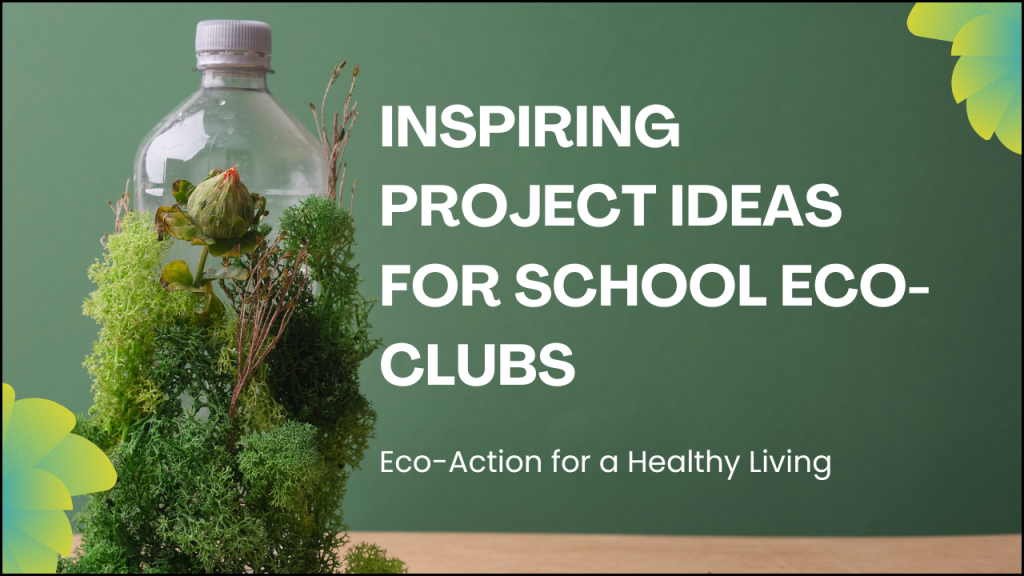
In today’s world, where environmental concerns dominate global discussions, schools have a unique opportunity to plant the seeds of eco-consciousness early on. One of the most dynamic ways to do this is through eco-clubs—student-led initiatives that focus on environmental awareness, action, and advocacy. These clubs not only foster a deeper connection with nature but also encourage teamwork, leadership, and civic responsibility.
But what makes an eco-club thrive? Engaging, hands-on projects that are fun, meaningful, and impactful. If you’re a student, teacher, or school administrator looking for creative and effective project ideas, we’ve got you covered. Here are some exciting eco-club projects that can spark change—both within and beyond school walls.
1. Tree Plantation Drives: Roots for the Future
There’s nothing more symbolic and impactful than planting trees. Organize regular tree-planting drives in your school or nearby community spaces. Involve students in selecting native species, understanding their ecological importance, and maintaining them post-planting.
2. Waste Warriors: Recycling and Upcycling Projects
Waste management is a pressing issue in urban and rural areas alike. Eco-clubs can become “Waste Warriors” by launching initiatives that promote the 3 Rs—Reduce, Reuse, and Recycle.
Projects could include:
- Setting up a waste segregation system in school.
- Creating upcycled art from plastic and paper waste.
- Organizing competitions like “Trash to Treasure.”
3. Composting Stations: Turning Scraps into Soil
Kitchen and garden waste can be turned into gold—compost! Set up compost bins in the school backyard. Students can learn how to compost organic waste and use it in the school garden.
This is an excellent science and sustainability lesson rolled into one. It also reduces landfill contributions and nurtures a sense of stewardship among students.
4. School Garden Projects: Grow What You Eat
Eco-clubs can create a small kitchen or herbal garden on school premises. Encourage students to grow herbs, vegetables, and native plants using organic methods. The produce can be used in the school canteen or donated to a local community kitchen.
This also opens the door to exciting topics like permaculture, soil health, and food miles.
5. Bird and Butterfly Habitats: Creating Nature-Friendly Corners
Set up zones on campus where birds, bees, and butterflies can thrive. This could include birdhouses, feeders, water bowls, and butterfly-friendly plants. Students can take part in weekly observation sessions to record species visits, which makes for a great biology project too.
This fosters appreciation for biodiversity and brings nature closer to the school environment.
6. Eco-Bricks and Plastic Collection Drives
Non-recyclable plastic can be turned into eco-bricks—plastic-filled bottles that can be used as construction material. Conduct awareness sessions and encourage students to bring eco-bricks from home.
You can also collaborate with local NGOs or recycling centers to responsibly dispose of collected waste.
7. Green Audits: Make Your School Sustainable
A Green Audit is a fun and educational way to assess your school’s eco-friendliness. It can include audits on energy, water usage, waste generation, and biodiversity.
Divide students into teams to assess different areas. After the audit, present the findings in an assembly and suggest improvement measures. This encourages data analysis, communication skills, and action-oriented thinking.
8. No-Plastic Campaigns and Eco-Exhibitions
Ban single-use plastic in school and host a monthly “No-Plastic Day.” Encourage students to bring steel lunch boxes and cloth bags. Pair it with eco-exhibitions where students display projects, posters, and innovations related to environmental conservation.
9. Water Conservation Projects: Every Drop Counts
Start with small actions that have big impacts:
- Fix leaking taps.
- Install rainwater harvesting units (even mini ones as models).
- Promote “Save Water” awareness through creative campaigns, skits, and poster competitions.
10. Nature Walks and Clean-Up Drives
Organize regular nature walks to nearby parks, lakes, or forests. During these excursions, conduct clean-up drives. Make it fun by turning it into a scavenger hunt or eco-themed quiz day.
This not only helps clean the environment but also instills a strong connection with nature.
Final Thoughts
As Mahatma Gandhi once said, “Be the change you wish to see in the world.” School eco-clubs embody this spirit. They may start small—with a single compost bin or a few planted trees—but the ripple effects of their efforts can be enormous.
Whether it’s a plastic-free campaign or a butterfly garden, every project is a step toward a greener tomorrow. So gather your friends, roll up your sleeves, and let your eco-club be the heart of positive environmental change in your school!









